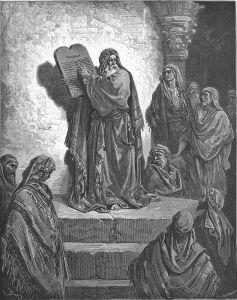America loves the Bible. Thing is, most Americans have no idea how complex the Bible actually is. Jewish, Protestant, Roman Catholic, and Christian Orthodox Bibles all have different contents. I was reminded of this the other day while trying to look up 4 Esdras. If you’re scratching your head saying, “4 Esdras? Is that even in the Bible?” it only makes my point. The books we call “the Apocrypha” are also known as “the Deuterocanon” by Catholics. The reasons are complicated, but the Apocrypha consists of books that were never in the Jewish Bible. Jerome, the 4th-5th-century biblical scholar translated the Bible into Latin (it was originally written in Hebrew and Greek, mostly). When he came to the Apocrypha, he translated those books too, but with a special heading saying they weren’t in the Jewish Bible. During the Middle Ages the headings were often left out and the Apocrypha was included with the “Old Testament.” During the Reformation, Protestants rejected all kinds of excess, including excess scripture. The Apocrypha was out. The Counter-Reformation, living up to the title, led to the definitive inclusion of the Apocrypha in Catholic Bibles. Meanwhile, different Orthodox groups kept some, rejected others, and added still others. When Americans say “the Bible,” they generally mean the Protestant Bible.
There are some implications to be thought through here, given that we’re talking about holy writ. Not all Christians agree on the same Bible. What’s more, the disagreements about what to include started pretty early. Does it count if you swear on an incomplete Bible? Would a New Testament do in a pinch? What if you’re Jewish? Having a national holy book is somewhat problematic when we can’t all agree on the contents. Many people would have some trouble opening right to some of the less popular books, say Ezra. Unless you’ve got a New Testament only, you’ll have Ezra. Go ahead, take a look. (It’s somewhere in the middle.)

Everybody’s complete Bible has the book of Ezra. So far, so good. 1 Esdras (“Esdras” is Latinized “Ezra”) is not in the Deutorcanon of the Catholic Church. It is, however, included in an appendix. It is part of the Orthodox canon, and it also goes by the names of 2 Esdras and 3 Esdras. Just to make it interesting, the Vulgate, or Latin translation of the Bible associated with Jerome, calls Ezra and Nehemiah 1 Esdras and 2 Esdras. Need a score card yet? It gets more confusing later! So 1 Esdras is either Ezra, 2 Esdras, 3 Esdras, or 1 Esdras, depending on whose Bible you’re borrowing. But where’s 4 Esdras? Well, there is a 2 Esdras (not the same as 1 Esdras or Nehemiah) in Slavonic, but not Greek, Orthodox Bibles. 2 Esdras is known as 3 Esdras and 4 Esdras, the latter when it is in the Vulgate appendix. The fun’s not over yet! 2 Esdras is broken into 3 parts and they are called 5 Ezra, 4 Ezra, and 6 Ezra. There is, however, no 1, 2, or 3 Ezra (unless the Latin name is Anglicized). If you’ve got a headache, take two Esdras and call me in the morning.
